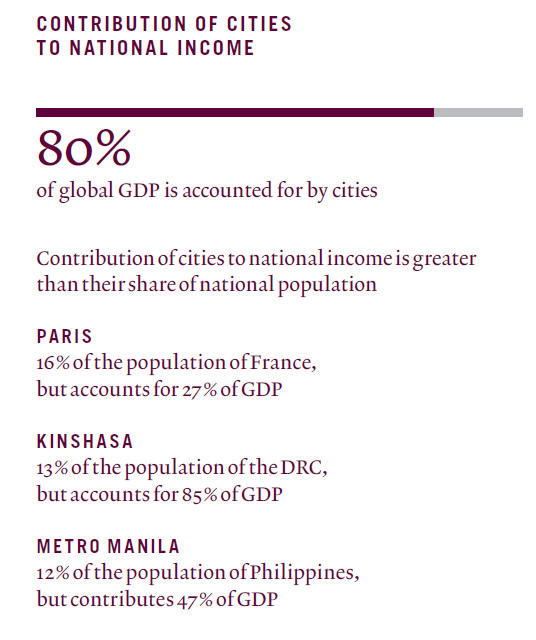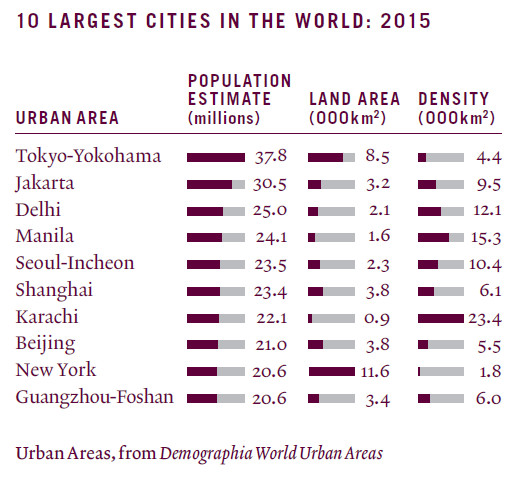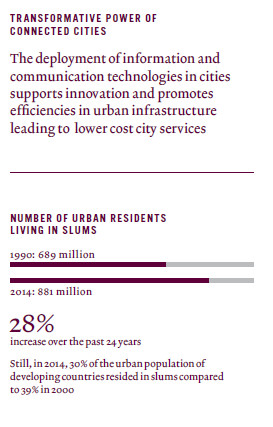The Executive Director of the UN Human Settlements Programme describes the reasons why more than half the world’s population has moved into cities and the challenges that need to be confronted to reap the benefits.For almost all of human history, people have lived in small towns, villages or the countryside. But the proportion of the world’s population living in cities has rapidly grown over the last two centuries, from 5 per cent in 1800, to 13 per cent in 1900 and 34 per cent by 1960. In 2008, a significant threshold in global urbanisation was crossed when more than half the people living on the planet had become city-dwellers.Nor are there signs of any slowdown in the growth of cities. According to Dr Joan Clos, Executive Director of UN-Habitat, which has monitored the progress of
Topics:
Perspectives Pictet considers the following as important: Future of cities, In Conversation With, Pictet Report, Pictet Report Winter 2018, Role of cities
This could be interesting, too:
Perspectives Pictet writes House View, October 2020
Perspectives Pictet writes Weekly View – Reality check
Perspectives Pictet writes Exceptional Swiss hospitality and haute cuisine
Jessica Martin writes On the ground in over 80 countries – neutral, impartial and independent
The Executive Director of the UN Human Settlements Programme describes the reasons why more than half the world’s population has moved into cities and the challenges that need to be confronted to reap the benefits.
For almost all of human history, people have lived in small towns, villages or the countryside. But the proportion of the world’s population living in cities has rapidly grown over the last two centuries, from 5 per cent in 1800, to 13 per cent in 1900 and 34 per cent by 1960. In 2008, a significant threshold in global urbanisation was crossed when more than half the people living on the planet had become city-dwellers.
Nor are there signs of any slowdown in the growth of cities. According to Dr Joan Clos, Executive Director of UN-Habitat, which has monitored the progress of urbanisation since 1978, the proportion has already reached more than 55 per cent and is now heading for 60 per cent. The UN predicts that it will grow to between 65 and 70 per cent over the next 20 years – part of a demographic process that is fundamentally changing the planet.
‘Cities are productive engines of growth,’ Dr Clos says. ‘They bring economies of scale, develop markets, create jobs and encourage new economic activities to flourish. As economies move from primary activities such as farming, fishing and mining to industrial production and then on to services, the role of cities in the global economy increases with each transition.
‘People move to the cities because they are places where they can see opportunities for a better and more prosperous life. In many parts of the world, city growth presents huge challenges through its impact on the environment and on political, economic and social conditions. However, such challenges can be addressed through investment and urban policies to improve the quality of urban life.’
Dr Clos, a medical doctor by profession, has held his office at UN-Habitat since 2010. Previously, he had a distinguished career in public service and diplomacy, which included two terms as elected mayor of Barcelona, where he presided over far-reaching investment programmes for the city’s urban renewal.
He describes UN-Habitat – its full name is the United Nations Human Settlements Programme – as an international urban observatory. Its role is to monitor trends in urbanisation, identify the main problems facing cities and analyse how these affect city-dwellers on issues such as housing, sanitation and other basic services. It investigates how urbanisation can be managed in a positive manner and advises governments and cities on how to improve living conditions.
‘Urbanisation is a complex reality: it delivers wealth and prosperity, but at the same time it has a cost. A financial framework must be established to cover those costs through taxation, along with public policies to keep the city in good shape. Urbanisation sometimes seems to emerge spontaneously, often in the form of slums, but it needs to be improved through formal processes such as urban planning, urban design, rules and regulations.
‘This must involve everyone in the cities, because urbanisation transforms societies and forces people to learn different forms of behaviour and social skills. It is not just about buildings and streets: a change of culture is needed, which can take time to develop. Those still living outside urban areas also need to adapt to the new forms of commerce which are consequences of urbanisation.’
The growth of cities was first seen in more developed regions of the world such as Europe and later North America. But in recent decades, Asia has urbanised at an enormous pace, says Dr Clos – it now has more than half of the world’s 40 megacities (those with more than 10 million inhabitants). Africa is beginning to urbanise fast, and already has three megacities in Cairo, Lagos and Kinshasa.

‘Cities in Africa that were small towns 20 years ago are now home to millions of people. Migrants tend to head for the biggest cities, which can become so large that the quality of life is constrained by their growth. Some countries have dealt with this with urban policies that spread migrants from the countryside between cities.’
Urban policies need to maximise the outcomes of urbanisation, he adds, and minimise the costs – which is a constant struggle. In general, city-dwellers find themselves living better lives, because it is cheaper to provide them with services in cost per capita. But this is not inevitable: where resources are limited and competition for them is acute, there is a risk of conflict in the absence of proper management.
He says there are good examples of well-planned urbanisation. ‘Singapore was extremely poor 70 years ago, and is now one of the richest countries in the world. What changed was the introduction of policies to address the realities of urban life in a small but densely populated city-state.

But China has also demonstrated that the pace of city economic development can be accelerated with adequate urban policies. Admittedly they have problems of environmental degradation, but those problems are being addressed with new policies.’
There are some serious threats to cities which need to be addressed: 80 per cent of the largest cities are vulnerable to severe impacts from earthquakes; 60 per cent from storm surges and tsunamis; and all face the impact of climate change, which includes rising sea levels.
Social and political crises can lead to conflicts or wars and sometimes also create large migration flows. Wars used to be outside cities, where armies would clash on battlefields and perhaps lay sieges, but modern wars are turning cities into battlefields by using new forms of warfare.
Large cities need to be well-planned to build resilience for such eventualities, one of the many issues that UN-Habitat focuses on. But Dr Clos is an optimist at heart: while some of the challenges are daunting, research shows that many cities have found ways of dealing with them; and national and city governments are keen to learn from the experience of those that are successful.
With climate change, for example, 70 per cent of greenhouse gas emissions come from cities, which account for 55 per cent of the world’s population who consume more energy per head than people living in rural areas. Their share of global emissions is likely to increase further as urbanisation grows, so it is vital that cities accelerate the use of renewable energy, says Dr Clos. They can also decarbonise consumption by encouraging walking, cycling and electric forms of transport and constructing smart buildings.
Social tensions may emerge in cities where urban divides are widening because of low-paid jobs at the bottom of the income distribution and high salaries at the top. Redistributive policies can balance the social outcomes of the city economy, and doing so is easier in urban areas where there is better food and good basic services like sanitation.
Slums in cities are a perennial problem, but one that can be reduced or eliminated. ‘All through human history, people moving into cities to find prosperity have created slums because they can’t find decent places to live. But many cities have implemented policies to build affordable housing as alternatives.

‘It is not just a question of better buildings, however: good jobs are also needed so that people have enough income to live in them. It will not happen spontaneously, but there are plenty of good examples of large cities succeeding in providing affordable housing. It is not rocket science, but it does require a very demanding political commitment.’
Water is another challenging issue in many parts of the world where supplies of clean water are limited. Increasing the supply requires investment in treatment plants, energy to power them and political mechanisms to give access to everyone. ‘It can be done, even in the driest places,’ says Dr Clos. ‘Where there’s a will, there’s a way.’
And finding those ways should be a big priority for the future, he adds. ‘There is a need to fine-tune the capacities of local government to deal with such challenges. Participatory processes to devise a vision and a strategy for change must be deepened to legitimise them with the people who will have to pay the price of implementing them. Nations and cities need to invest in governance processes to reap the benefits of urbanisation.
